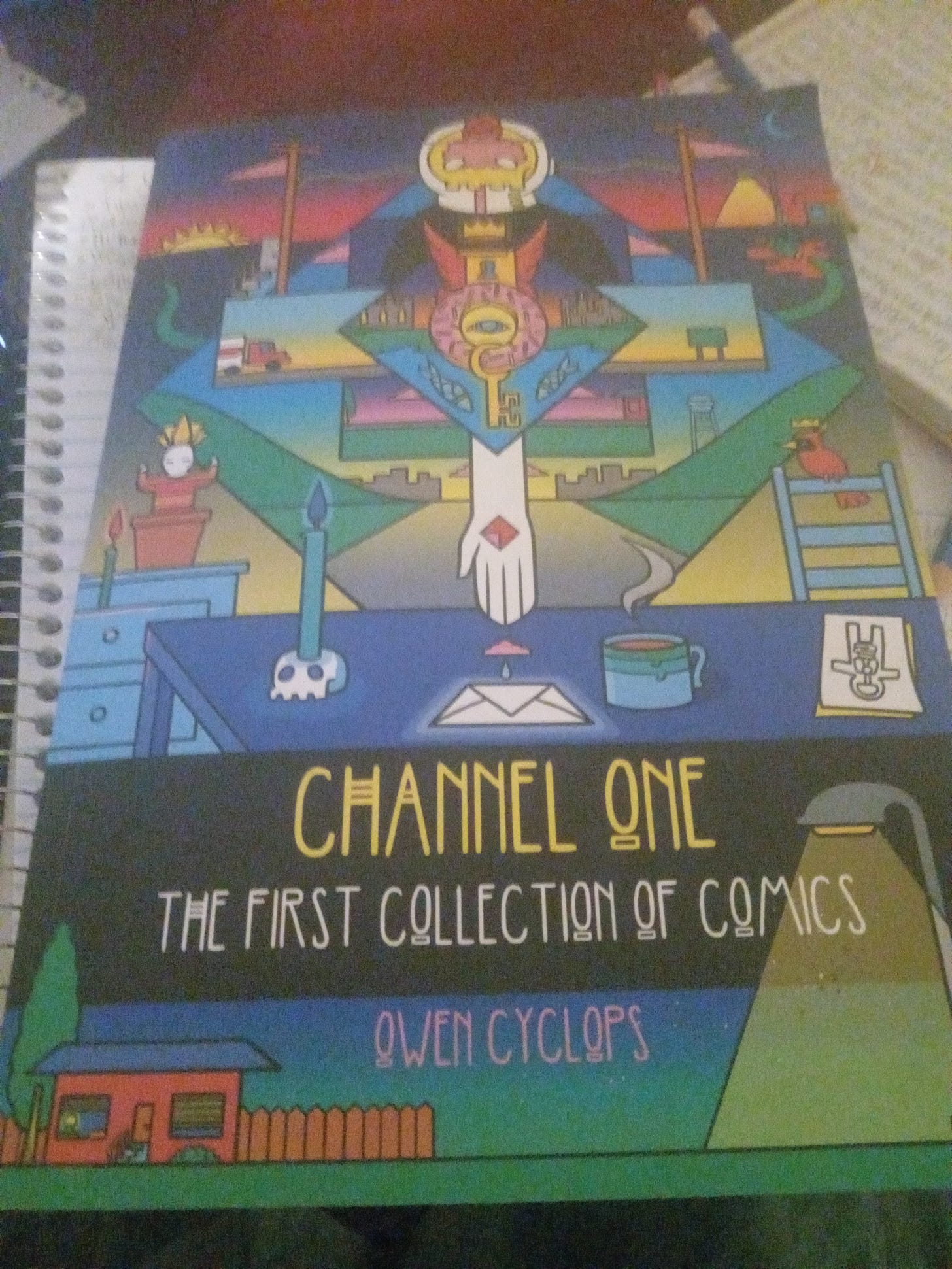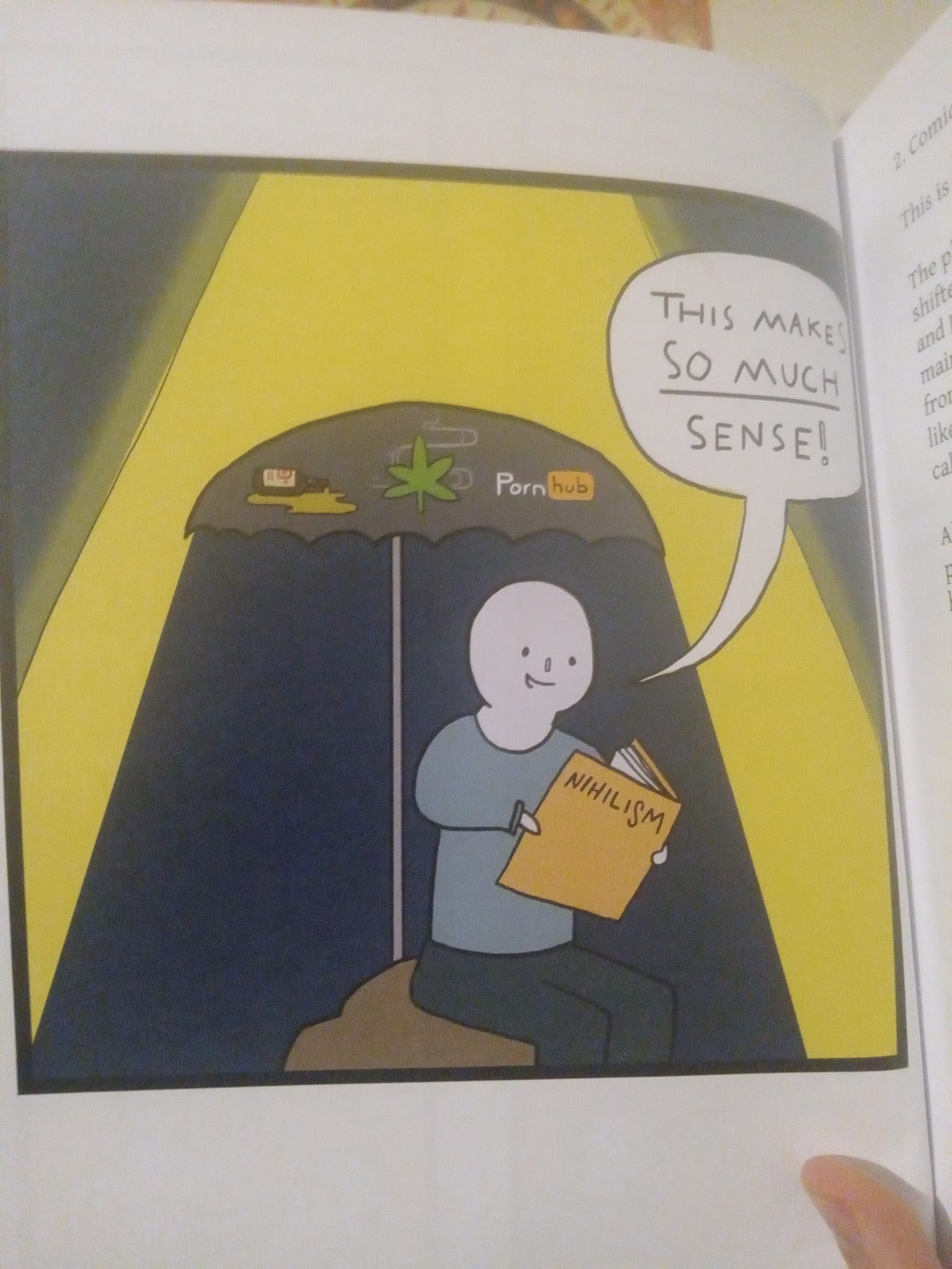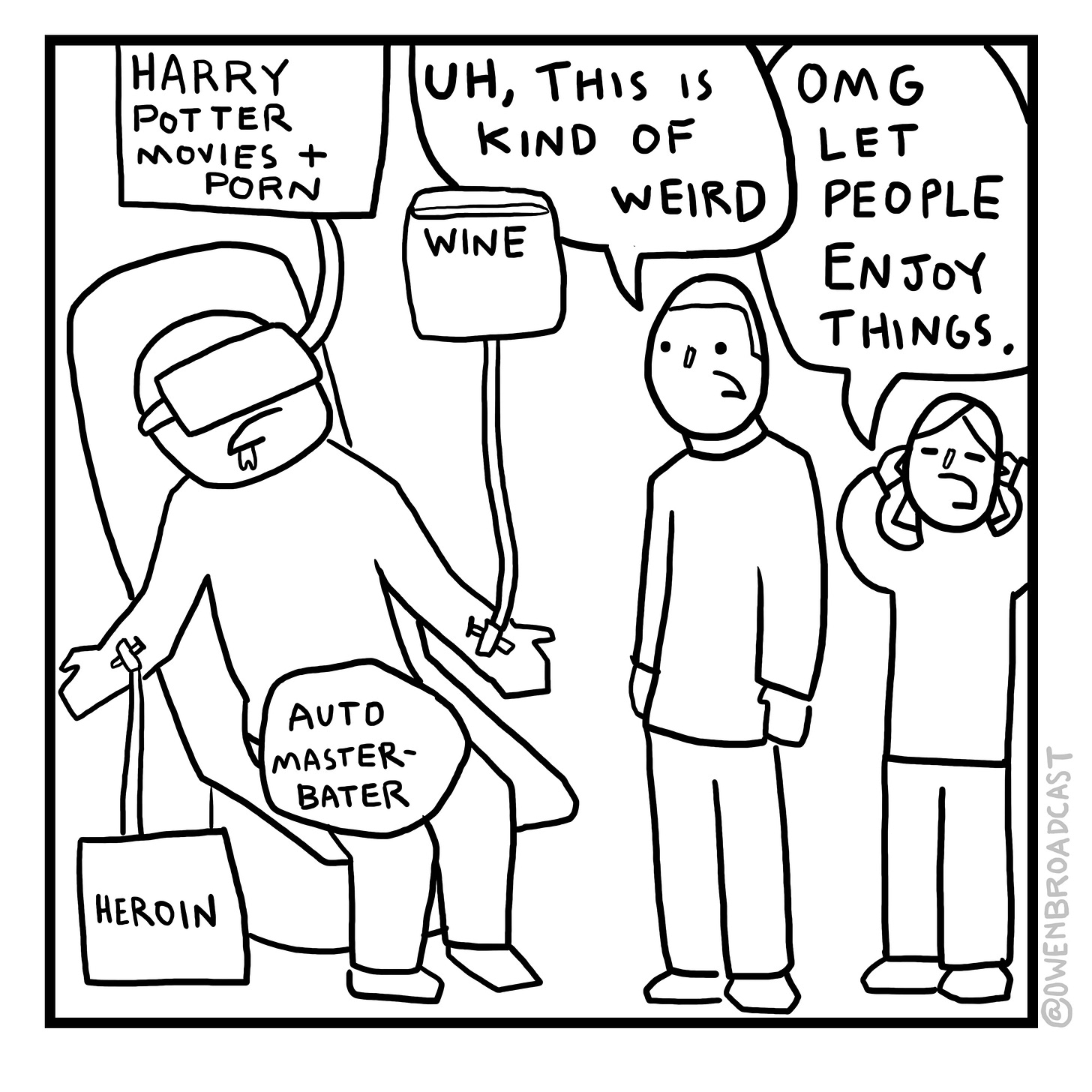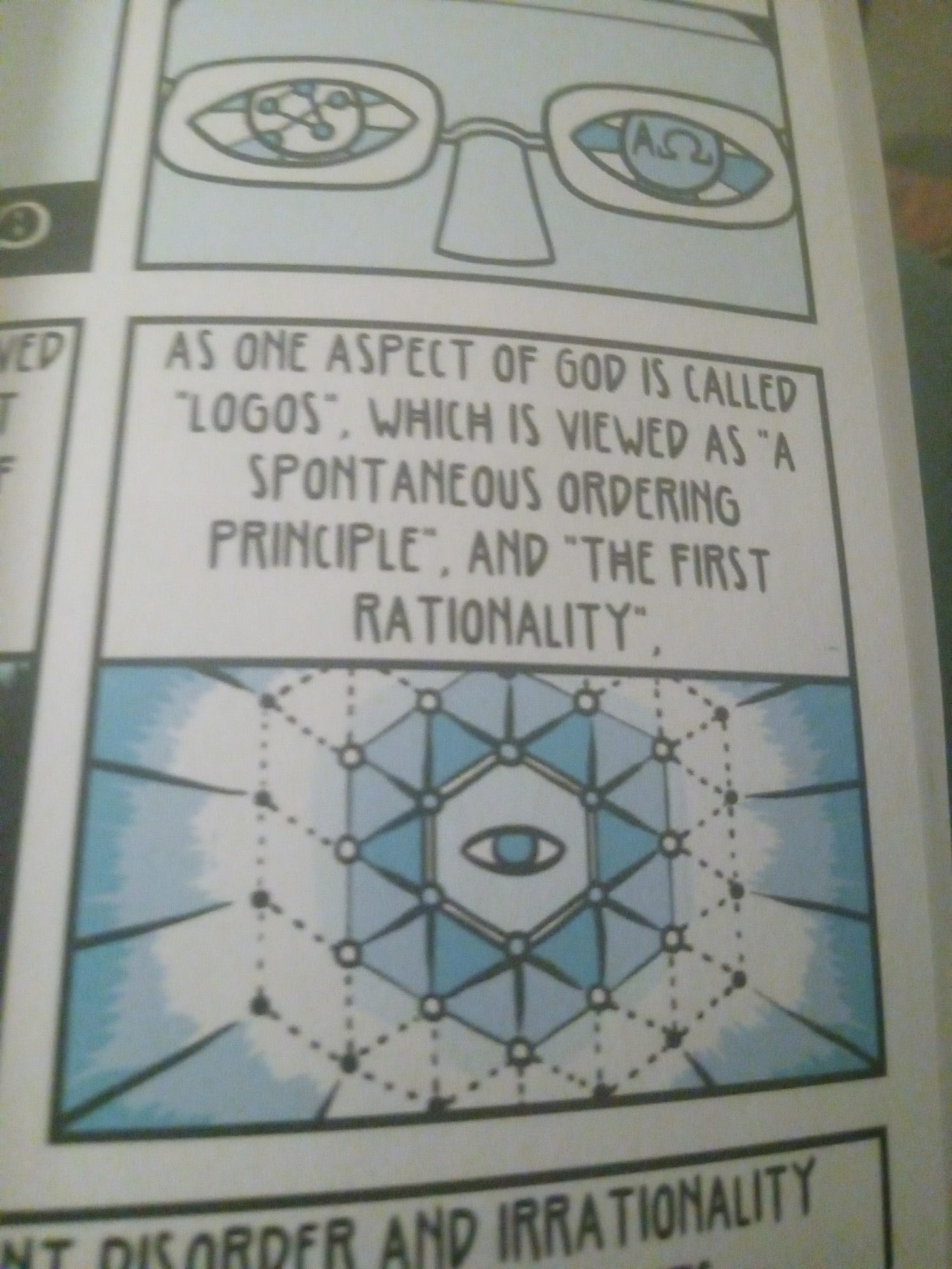Review & Analysis of Owen Cyclops' "Channel One"
Comics Against Modernity
Since I’m very excited that Owen Cyclops’ next book, Babyology, has recently released, I decided to read his first book again as I wait for his next work to be shipped to me. My second read-through inspired me to write this review and analysis of Channel One.
If you’ve spent any time at all in the weird and wonderful sphere of the internet where conspiracy theories, metaphysical speculations, and memes collide you’ve no doubt encountered many works by Owen Cyclops (@OwenBroadcast), possibly without knowing it. He is the one responsible for the comics above and below this paragraph. I saw these before I found Owen’s website / Twitter and appreciated them for the fact that not only were they funny, but because they instantly conveyed complex critiques of modernity. That is the power of the comic artist. He cuts through the miasma of argumentation and gets his idea deeply implanted directly into your mind. Visual imagery transmits ideas, even profound ones, almost instantaneously. People generally are much less guarded with images than they are with texts so the potential to challenge the mainstream while avoiding the censor’s wrath is much higher. Owen’s work helps to spread good illiberal ideas to a very wide audience. Art is one of our best weapons against the forces of ancient spiritual evil that reign in our time. If art can convey the ideas of The Enemy of course it can convey our ideas too, and our art will of course be more beautiful since our ideas are more true.
Just to take those two comics above, they convey the same critique of Modernity being a soul-wrecking carnival of empty pleasures to someone in a way that is fun without them having to read an entire book or essay about that topic and there are far too many of those! We need a bit less grumpy intellectual curmudgeons and more good cartoonists on The Right, frankly. You could try to get a normie to come to the conclusion that modernity enslaves you to meaningless gratification by having them spend many nights reading a knockoff of Huxley’s Brave New World, or you could just get them to look at those comical cartoons above and put a smile on their face besides in much less time.
There’s a certain snobby attitude that exists out there that looks down on comics as unsophisticated, which is an utterly untrue perspective. Words and images when considered separately can tell an endless amount of stories, so who can even calculate the potential of what words and images combined can do? These two infinities of creative potential when combined in the form of a comic have whole universes of stories that have yet to be told and insights that have yet to be discovered. The sheer potential of comics as a medium lays largely untapped in the West, but Owen has made pioneering work in using comics to convey subversive anti-modernist concepts that are good and true in a way that is beautiful.
This collection has a biographical flair to it that charms you into liking the artist. It helps to know your guide when you are embarking on a metaphysical journey, which is what this book is. The introduction gives you a glimpse into a life that is unique and yet very relatable, which is the case with all well-lived lives. The sections of the book are prefaced by an introduction that explains where the artist’s mind was when he made the particular set of comics in that section. It’s inspiring being able to see Owen grow as an artist as we move from section to section. The sheer variety in this collection, ranging from darkly humorous jokes, to intellectually stimulating dialogues, to dream-like narratives, ensures that you’ll never be bored as you flip through this collection.
The first section is a good introduction to the vital imagination of the author. The second section describes his journey into becoming a “Conspiracy Theorist” or “Redpilled” guy for lack of better words. This journey, which I presume all readers of my newsletter have undertaken, is different for all of us but we can all relate to someone else’s journey. The jubilant thrill of discovering truths that make the world make sense for the first time is followed by the bitter pain of realizing that most will never go beyond the tight enclosure of what society deems acceptable for us to think. The truth-seeker inevitably becomes alienated, and most of us need to develop a “Mask” just to survive in day to day interactions with others. We all know what this is like. Seeing someone else’s experience with these archetypal turning points in the life of a truth-seeker helps us to reflect on our own journey.
The third section presents more fleshed-out comics than what we saw in the first section, and the delightful variety of them in terms of both tone and content stops us from ever getting bored. There are darkly comical critiques interspersed with some seriously very poignant stories that will leave you shook with your mind processing what you just read.
The fourth and seventh sections are attempts at doing some world building, and the author says in the introduction to these sections that these stories were abandoned. They are the weakest part of this collection, though still fun to read. The need for a “Punch Line” makes the stories in the cerebral world he is building in these sections not really flow well especially when compared to the more fully fleshed out ideas in the previous section where each story was self-contained. The shorter, more episodic ideas are more complete and more of a world you can imagine yourself in than these sections.
Though there are some attempts at worldbuilding and making long-form stories, this book is at its best when it’s like a zany “Twilight Zone” where each episode is a fully self contained story and the reader just never know where he’s going to be taken next as you go from banana girl to prometheus. This sense of suspense, “What will the next story be?” creates some drama in itself in a meta way. Not knowing whether the next story will be goofy or poignant, the sheer variety of tones the tales are told in, is where this collection shines.
There is a clever playfulness that is willing to experiment with ideas from the sheer joy of it that exudes from these pages that I really appreciate. It’s not uncommon of course that one stumbles upon new revelations when one is freely toying with ideas in this way, though that’s not the aim of such activity, the aim is just to have fun which is of course supremely valuable in and of itself. Fun is always its own justification. There is no pleasure more complex than thought, as Borges wrote. Vigorously wild speculation, of the kind that adopts entire worldviews only to abandon them when seeing the world through that lens ceases to be interesting, can yield many fresh ideas. I enjoy the attitude of one who mixes together entire metaphysical systems like a mad alchemist, not because he is necessarily looking for something to “believe” but just for its own sake: “Will it congeal? Will it explode? Will it make a whole new substance hitherto unknown? Eureka!” To experiment in one’s laboratory with ideas considered unquestionable for generations can help those ideas to be zapped back to life, as Owen is doing with Traditional Western Christianity (though there is more than an undercurrent of occultism in his worldview which I appreciate). This sort of exuberant whimsical thinking, a graceful dance of the speculative imagination, does not even once become a merely unprincipled relativistic postmodernism when it is properly done. The kind of flimsy character attracted to relativism is not even capable of the sort of imaginative speculation I am talking about and which Owen demonstrates in his book, partly because the postmodernist believes in relativism even more dogmatically than any puritanical stooge believes in anything. But also, they’re not capable of the strength of a free spirit that imaginative speculation requires. To hold onto your principles firmly but gently, not clutching them so hard that they break them as the dogmatic stooge does or clumsily dropping them as the flimsy relativist does, that is the activity of a philosopher with imagination. Such a person drops their principles only to elegantly catch them again in mid-air as in an elaborate dance. The magical realist Jorge Luis Borges had that kind of a mind and Owen Cyclops does too, and how special it is for this imaginative speculation to express itself in comic art!
Consider the quantum mechanics comic, which seems like it really could be a “Schizo but kind of makes sense” interpretation of Christianity that someone really believes in, of the kind that you could stumble on in the digital wilderness when going down a rabbithole on the internet one night. Or consider the short comic where Owen talks about him and his wife creating a spontaneous Shintoism. There could be entire books written about either of these topics but a simple comic portrays them better.
Owen is clearly a man of real spiritual longings, high moral ideals, so he is not coming up with heresies every week for our diabolic entertainment. Rather, he understands the truth of the fact that an idea to be understood must be explored and experimented with, and so we emerge from a story about “Quantum Christianity” with a better understanding of Christian Orthodoxy and have had fun along the way. I think this sort of imaginative speculation is, in fact, indispensable to living a good and holy life. Many people interested in traditional religious ideals and traditional spirituality tend to think that if we narrow our thoughts enough that we will be able to walk on the narrow way which few find that leads to Heaven( Matt 7:13-14). But to walk the narrow path we must have a wide vision to be able to tell apart the narrow path from all the other paths. If we walk the narrow path with a narrow vision, that ensures we will stumble and walk off the path without knowing it. The devil makes every sinful madman think that he only stumbles because his vision is not narrow enough, and so he stumbles all the more! The narrow path is so narrow that unless we have an open mind we won’t be able to see it at all.
The balance of unchanging moral and spiritual ideals with a free-spirited love of experimentation is what we need to combat the stale relativistic authoritarianism of our time and Owen’s work conveys this balance perfectly. Standing on the firm ground of unchanging truths helps us to see the swirling whirlpool of ideas that are out there much more clearly. I think it’s important to celebrate Owen’s work at the present time because the online right-wing conspiracy theory scene is ossifying into myriad little dogmatic groups that have all the same cult-like behaviours as the ideologies that dominate society, and so it is that the conspiracy theorist and the conspirator he theorizes about are beginning to have a lot in common, which is quite disturbing. It’s precisely the love of free inquiry and a zest for new insights that lead us into the dissident right-wing scene along our journey to the Truth to begin with, so it’s disappointing to see the scene become just another dogmatic cult.
The light-heartedness of Owen’s colorful first collection of comics helps us to overcome this squalid close-mindedness by enriching our imaginations. Imagination is just the mind vitally alive, so it helps us to understand traditional moral and spiritual ideals when we try to understand them through our imaginations. Traditional ideas are not just antiques or dead abstractions but spiritual nourishment. By grasping at traditional ideas with our playful imagination and not just our analytical intelligence we make those old ideas get get resurrected from the dead, and thus they can help us become the happy and holy people God wants us to be. We must overcome the staleness of the spirit that permeates our age not for the sake of vain novelty-seeking but to even walk the spiritual path at all.
The idea that the imagination is a superfluous dimension of the human being is not Traditional at all but the Modernist product of cold thinking from The Enlightenment, the most inappropriately named of epochs. The men of the past, whether Pagan or Christian, always understood the quintessential role of the imagination and of art in transmitting the truths that elevate our souls. The resacralization of The West was always meant to involve the rediscovery of the role of imagination in the spiritual life.
The truth is, Imagination is to the world of the spirit what the senses are to the world of matter: an imperfect, faulty instrument for discerning reality that we can get better at using with practice. Stimulating your imagination and just using it for its own sake are how we get better at using it, to the point where some among us may even perceive directly the Eternal Uncreated Light from whence all other things come.
I look forward to refreshing my imagination with more of Owen’s work in the future. I highly recommend this collection of comics. I will review Babyology after I have read it but I have high hopes. The volume I discussed, Channel One, is available here: https://www.amazon.com/Channel-One-First-Collection-Comics/dp/B09MYQ94KJ?ref_=ast_author_dp
Owen’s second book, entitled Babyology, came out very recently. It’s available here: https://www.amazon.com/Babyology-One-Owen-Cyclops/dp/B0CPC9T741?ref_=ast_author_dp
Thanks for reading. If you enjoyed, please like and share.
To receive my weekly writings directly in your mailbox, consider subscribing. Though at this moment all content on my substack is free, I will be releasing content for paying subscribers only [$5/month] in the future. Paying subscribers will also be able to suggest topics to write about.






